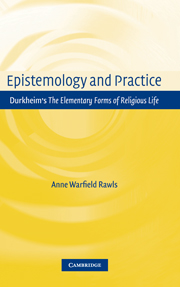Book contents
- Frontmatter
- Contents
- Acknowledgments
- Introduction
- 1 Durkheim's Outline of the Argument in the Introductory Chapter
- 2 Durkheim's Dualism: an Anti-Kantian, Anti-Rationalist Position
- 3 Sacred and Profane: the First Classification
- 4 Totemism and the Problem of Individualism
- 5 The Origin of Moral Force
- 6 The Primacy of Rites in the Origin of Causality
- 7 Imitative Rites and the Category of Causality
- 8 The Category of Causality
- 9 Logic, Language and Science
- 10 Durkheim's Conclusion Section iv: Logical Argument for Social Origin of the Categories
- Conclusion
- Bibliography
- Index
1 - Durkheim's Outline of the Argument in the Introductory Chapter
Published online by Cambridge University Press: 22 September 2009
- Frontmatter
- Contents
- Acknowledgments
- Introduction
- 1 Durkheim's Outline of the Argument in the Introductory Chapter
- 2 Durkheim's Dualism: an Anti-Kantian, Anti-Rationalist Position
- 3 Sacred and Profane: the First Classification
- 4 Totemism and the Problem of Individualism
- 5 The Origin of Moral Force
- 6 The Primacy of Rites in the Origin of Causality
- 7 Imitative Rites and the Category of Causality
- 8 The Category of Causality
- 9 Logic, Language and Science
- 10 Durkheim's Conclusion Section iv: Logical Argument for Social Origin of the Categories
- Conclusion
- Bibliography
- Index
Summary
Durkheim makes large claims with regard to his epistemological argument in the introductory chapter of The Elementary Forms. He promises to provide an empirical demonstration of an ever present and universal reality. That reality, according to Durkheim, is not religion, or any particular cultural or social form, but rather “man,” (l'homme) and that which is necessary in order for persons to become recognizably human. Durkheim is referring to nothing less than an empirical proof of the social causes of the development of human reason. The claims are large and the scope of the argument outlined impressive. Nevertheless, the introductory chapter of The Elementary Forms is significant, not so much for what it says about Durkheim's epistemology, as for what it leaves unsaid.
The epistemology is announced, but not worked out, in the Introduction. The emphasis there is placed on reviewing opposing arguments, and justifying the choice of Archaic religion as a focus. In the central chapters, by contrast, Durkheim's epistemology is worked out in detail. As a consequence, the Introduction and the central chapters present Durkheim's argument in ways that appear to conflict on essential points; the “talk about” the epistemology in the Introduction, and the “demonstration of” the epistemology in the text, differing in substance. In addition, contradictory statements about the empirical validity of various ideas seem to appear one after the other in the Introduction. The argument of the central chapters, on the other hand, is careful, methodical and consistent.
- Type
- Chapter
- Information
- Epistemology and PracticeDurkheim's The Elementary Forms of Religious Life, pp. 28 - 71Publisher: Cambridge University PressPrint publication year: 2005



